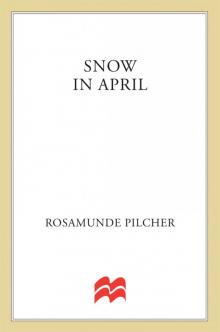- Home
- Rosamunde Pilcher
The Day of the Storm Page 6
The Day of the Storm Read online
Page 6
“That’s all right,” said Joss. “I’ll feed her.”
I started to protest, but once again I was overborne. “I’ll leave her here to get settled in and unpacked, and then I’ll be back about—” he glanced at his watch—“seven thirty, to pick her up. That all right?” he flung casually in my direction. “You’re an angel, Mrs Kernow, and I love you like a mother.” He put an arm around her and kissed her. She looked delighted; then he gave me a final, cheerful grin, said, “See you,” and so departed. We heard his car roaring away down the street.
“He’s a lovely boy,” Mrs Kernow informed me. “I had him living here three months or more … now come along, pick up your little bag and I’ll show you your room. ’Course it’ll be cold, but I’ve got an electric fire you can have, and the water in the tank’s nice and hot if you want a bath … I always say you feel so mucky coming off those dirty trains…”
The room was as tiny as all the other rooms in this little house, furnished with an enormous double bed which took up nearly all the space. But it was clean and, presently, warm, and after Mrs Kernow had shown me where to find the bathroom she went back downstairs and left me to myself.
I went to kneel by the low window and draw back the curtains. The old frames had been jammed tight shut against the wind by rubber wedges, and the dark glass streamed with rain. There was nothing to be seen, but I stayed there anyway, wondering what I was doing in this little house, and trying to work out why Joss Gardner’s sudden re-appearance in my life had left me with this unexplained feeling of unease.
4
I needed defences. I needed to build up my confidence and my self-esteem, disliking the role of rescued waif in which I had suddenly found myself. A hot bath and a change of clothes went a long way towards restoring my composure. I did my hair, made up my eyes, splashed on the last of a bottle of expensive scent and was halfway towards being in charge again. I had already unpacked a dress from the ubiquitous rucksack and hung it hopefully to shed its wrinkles; now I put it on, a dark cotton with long sleeves, and dark stockings, very fine, and shoes with heels and old-fashioned buckles which I had found, long back, on a stall in the Portobello Road … As I fastened my pearl ear-rings I heard, over the rattle and bang of the gusty wind, the sound of Joss Gardner’s little van, tyres drumming on the cobbles, coming up the street. It screeched to a noisy halt outside the door, and the next moment I heard his voice downstairs, calling first for Mrs Kernow and then for me.
I continued, slowly, to screw the fastening of the last ear-ring. I picked up my bag, and then my leather coat. This I had draped near the electric fire in the hope that it would dry off, but it hadn’t. The heat had merely emphasized the smell of a spaniel come in from a wet walk, and it still weighed heavy as lead. Lugging it over my arm, I went down the stairs.
“Hallo, there.” Joss, in the hall, looked up at me. “Well, what a transformation. Feel better now?”
“Yes.”
“Give me your coat…”
He took it from me intending to help me on with it, and instantly became a comic weightlifter, sagging at the knees with the sheer bulk of it.
“You can’t wear this, it’ll drive you into the ground. Anyway it’s still wet.”
“I haven’t got another.” Still toting the coat, he started to laugh. My self-esteem began to drain away and some of this must have showed on my face, because he suddenly stopped laughing and shouted for Mrs Kernow. When she appeared, with an expression both exasperated and loving on her face, he bundled my coat into her arms, told her to dry it for me, unbuttoned and removed his own black oilskin and laid it, with a certain grace, around my shoulders.
Beneath it he wore a soft grey sweater, a cotton scarf knotted at the neck. “Now,” he said, “we are ready to go.” He opened the door, on to a curtain of rain.
I protested, “But you’ll get wet,” but he only said “Scuttle” so I scuttled, and he scuttled too, and the next instant we were back in the van, scarcely wet at all, with the doors banged tight and shut against the storm, although small puddles of rain on my seat and at my feet gave rise to the suspicion that this staunch vehicle was no longer as watertight as it had once been. But he started the noisy engine and we were away, and with the volume of water both outside and inside the car it was a little like being taken for a fast ride in a leaky motor boat.
I said, “Where are we going?”
“The Anchor. It’s just round the corner. Not very smart. Do you mind?”
“Why should I mind?”
“You might mind. You might have wanted to be taken to The Castle.”
“You mean to foxtrot to a three-piece orchestra?”
He grinned. He said, “I can’t foxtrot. Nobody ever learned me.”
We flashed down Fish Lane, around a right angled corner or two, beneath a stone archway and so out into a small square. One side of this was formed by the low, uneven shape of an old inn. Warm light shone from behind small windows spilled from a crooked doorway and the Inn sign over the door swung and creaked in the wind. There were four or five cars already parked outside, and Joss inserted the van neatly into a tidy space between two of them, turned off the engine, said, “One, two, three, run,” and we both got out and sprinted the short distance between the car and the shelter of the porch.
There Joss shook himself slightly, brushed the rain from the soft surface of his sweater, took the oilskin off my shoulders and opened the door for me to go ahead of him.
It was warm inside, and low-ceilinged and smelt the way old pubs have always smelt. Of beer and pipe smoke and musty wood. There was a bar, with high stools, and tables around the edge of the room. Two old men were playing darts in a corner.
The barman looked up and said, “Hi, Joss.” Joss put the oilskin up on a coat hook, and led me across the room to be introduced.
“Tommy, this is Rebecca. Rebecca, this is Tommy Williams. He’s been here man and boy; anything you want to know about Porthkerris, or the people who live here, you come and ask Tommy.”
We said, “How do you do.” Tommy had grey hair and a lot of wrinkles. He looked as though he might be a fisherman in his spare time. We sat ourselves on two stools, and Joss ordered a scotch and soda for me and a scotch and water for himself, and while Tommy fixed these the two men began to talk, falling comfortably into conversation the way men in pubs always seem to.
“How are things going with you?” That was Tommy.
“Not too bad.”
“When are you opening up?”
“Easter, maybe, with a bit of luck.”
“Place finished is it?”
“More or less.”
“Who’s doing the carpentry?”
“Doing it myself.”
“That’ll save you something.”
My attention wandered. I lit a cigarette and looked around me, liking what I saw. The two old men playing darts; a young couple, jeaned and longhaired, crouched over a table and a couple of pints of bitter, discussing, with avid and intense concentration—existentialism? Concrete painting? How they were going to pay the rent? Something. But it mattered, intensely, to both of them.
And then a party of four, older, expensively dressed, the men self-consciously casual, the women unwittingly formal. I guessed they were staying at The Castle, and out of boredom with the weather, perhaps, had come down the town for a spot of slumming. They seemed uncomfortable, as though they knew they looked out of place, and could scarcely wait to get back to the padded velvet comfort of the big hotel on the hill.
My eyes moved on around the room, and it was then that I caught sight of the dog. He was a beautiful dog, a great red setter, his coat handsome and shining, his tail a silken plume of copper fur against the grey flags of the floor. He sat very still, close to his master, and every now and then the tail would move slightly in a thump of approval, a private applause.
Intrigued, I inspected the man who appeared to own this enviable creature, and found him almost as interesting as the dog. Si
tting, with an elbow on the table top, and his chin resting on his fist, he presented to me a clear and unblurred profile, almost as though he were posing for my inspection. His head was well shaped, and his hair had that thick silver-fox look of a person who has started to go grey early in life. The single eye which his profile allowed me was deep set, and darkly shadowed, the nose was long and aquiline, the mouth pleasant, the chin strongly formed. And, from the length of his wrist, emerging from a checked shirt cuff and the sleeve of a grey tweed jacket, and the way he disposed of his legs beneath the little table, I guessed that he was tall, probably over six feet.
As I watched him, he laughed suddenly at something his companion had said. This drew my attention to the other man, and I felt a shock of surprise, because, for some reason, they did not match. Where the one was slender and elegant, the other was short, fat, red of face, and dressed in a tight-fitting navy blue blazer and a shirt collar that looked as though it were about to strangle him. It was not overly warm in the pub, but there was a shine of sweat on the ruddy brow, and I saw that the dark hair had been barbered with some ingenuity, so that a long oiled lock was combed up and over, concealing what would otherwise have been a totally bald head.
The man with the dog was not smoking, but the fat man suddenly crushed out his own cigarette in the brimming ashtray on the table, as though emphasizing some point that he was making, and almost instantly reached into his pocket for a silver case and another cigarette.
But the man with the dog had decided that it was time to go. He took his hand from his chin, pushed back his shirt cuff to consult his watch, and then finished his drink. The fat man, apparently anxious to comply with the other’s arrangements, hastily lit the cigarette and then tossed back his whisky. They began to get up, pushing back their chairs with a hideous scraping sound. The dog stood up, his tail swooping in exultant circles.
Standing, one so short and fat and the other so tall and slim, the two men looked more ill-assorted than ever. The thin one reached for a raincoat which had been lying across the back of his chair and slung it over his shoulders like a cloak, and then turned towards us, heading for the door. For an instant I was disappointed, because full face, his finely drawn good looks did not live up to the promise of that intriguing profile. And then I forgot about being disappointed, because he suddenly saw Joss. And Joss, perhaps sensing his presence, stopped talking to Tommy Williams and turned to see who was standing behind him. For an instant they both looked disconcerted, and then the tall man smiled, and the smile etched lines down his thin brown cheeks and creased up his eyes, and it was impossible not to be warmed by such charm.
He said, “Joss. Long time no see.” His voice was pleasant and friendly.
“Hi,” said Joss, not getting off his stool.
“I thought you were in London.”
“No. Back again.”
The creaking swing of the door caught my attention. The other man, the fat man, had quietly left. I decided that he had an urgent appointment and thought no more about it.
“I’ll tell the old boy I’ve seen you.”
“Yes. Do that.”
The deep set eyes moved in my direction, and then away again. I waited to be introduced, but nothing happened. For some reason this lack of manners on Joss’s part was like a slap in the face.
At last, “Well, see you around,” said the tall man, and moved off.
“Sure,” said Joss.
“Night, Tommy,” he called to the barman as he pushed the door open and let the dog out ahead of him.
“Good night, Mr Bayliss,” said the barman.
I felt my head jerk around as though someone had pulled a string. He had already disappeared, leaving the door swinging behind him. Without thinking, I slipped off the stool to go after him, but a hand caught my arm and restrained me, and I turned to find Joss holding me back. For a surprising second our eyes clashed, and then I shook myself free. Outside I heard a car start up. Now it was too late.
I said, “Who is he?”
“Eliot Bayliss.”
Eliot. Roger’s boy. Mollie’s child. Grenville Bayliss’s grandson. My cousin. My family.
“He’s my cousin.”
“I didn’t know that.”
“You know my name. Why didn’t you tell him? Why did you stop me going after him?”
“You’ll meet him soon enough. Tonight it’s too late and too wet and too dark for family reunions.”
“Grenville Bayliss is my grandfather, too.”
“I thought there was probably some connection,” said Joss coolly. “Have another drink.”
By now I was really angry. “I don’t want another drink.”
“In that case, let’s go and eat.”
“I don’t want to eat either.”
I thought that I truly didn’t want to. I didn’t want to spend another moment with this boorish and overbearing young man. I watched him finish his drink and get down off his stool, and for an instant I thought that he was actually going to take me at my word; was going to drive me back to Fish Lane and there dump me, un-nourished. But, luckily, he did not call my bluff, simply paid for the drinks, and without a word led the way through a door at the far end of the bar, which gave on to a flight of stairs and a small restaurant. I followed him because there didn’t seem to be anything else to do. Besides, I was hungry.
Most of the tables were already occupied, but a waitress saw Joss and recognized him and came over to say good evening, and led us to what was obviously the best table in the room, set in the narrow alcove of a jutting bay window. Beyond the window could be seen the shapes of rain-washed roofs, and beyond them again the liquid darkness of the harbour, a-shimmer with reflections from the street lamps on the quay and the riding lights of fishing boats.
We faced each other. I was still deeply angry and would not look at him. I sat, drawing patterns with my finger on the table mat, and listened to him ordering what I was to eat. Apparently I was not even to be allowed the right of making my own choice. I heard the waitress say, “For the young lady, too?” as though even she were surprised by his cursory behaviour, and Joss said, “Yes, for the young lady, too,” and the waitress went off, and we were alone.
After a little I looked up. His dark gaze met mine, unblinking. The silence grew, and I had the ridiculous feeling that he was waiting for me to apologize to him.
I heard myself say, “If you won’t let me talk to Eliot Bayliss, perhaps you’ll talk about him.”
“What do you want to know?”
“Is he married?” It was the first question that came into my head.
“No.”
“He’s attractive.” Joss acknowledged this. “Does he live alone?”
“No, with his mother. They have a house up at High Cross, six miles or so from here, but about a year ago they moved into Boscarva, to be with the old man.”
“Is my grandfather ill?”
“You don’t know very much about your family, do you?”
“No.” I sounded defiant.
“About ten years ago Grenville Bayliss had a heart attack. That’s when he stopped painting. But he always appears to have had the constitution of an ox, and he made a miraculous recovery. He didn’t want to leave Boscarva, and he had this couple to take care of him…”
“The Pettifers?”
Joss frowned. “How do you know about the Pettifers?”
“My mother told me.” I thought of the long-ago tea parties by the kitchen fire. “I never imagined they’d still be there.”
“Mrs Pettifer died last year, so Pettifer and your grandfather were left on their own. Grenville Bayliss is eighty now, and Pettifer can’t be far behind him. Mollie Bayliss wanted them to move up to High Cross and sell Boscarva, but the old man was adamant, so in the end she and Eliot moved in with him. Without noticeable enthusiasm, I may add.” He leaned back in his chair, his long clever hands resting on the edge of the table. “Your mother … was she called Lisa?” I nodded.
“
I knew Grenville had a daughter who’d had a daughter, but the fact that you call yourself Bayliss threw me slightly.”
“My father left my mother before I was born. She never used his name.”
“Where’s your mother now?”
“She died—just a few days ago. In Ibiza.” I repeated, “Just a few days ago,” because all at once it seemed like a lifetime.
“I’m sorry.” I made some sort of vague gesture, because there weren’t any words. “Does your grandfather know?”
“I don’t know.”
“Have you come to tell him?”
“I suppose I may have to.” The idea of doing so was daunting.
“Does he know you’re here? In Porthkerris?”
I shook my head. “He doesn’t even know me. I mean we’ve never met. I’ve never been here before.” I made the final admission. “I don’t even know how to find his house.”
“One way and another,” said Joss, “you’re going to give him something of a shock.”
I felt anxious. “Is he very frail?”
“No, he’s not frail. He’s fantastically tough. But he’s getting old.”
“My mother says he was frightening. Is he still frightening?”
Joss made a gruesome face, doing nothing to comfort me. “Terrifying,” he said.
The waitress brought our soup. It was oxtail, thick and brown and very hot. I was so hungry that I ate it right down to the bottom of the bowl without saying another word. As I finally laid down my spoon, I looked up and saw that Joss was laughing at me.
“For a girl who didn’t want to eat, you haven’t done so badly.”
But this time I did not rise. I pushed the empty bowl away, and leaned my elbows on the table.
“How is it that you know so much about the Bayliss family?” I asked him.
Joss had not bolted his soup as I had. Now, he was taking his time, buttering a roll, being maddeningly slow.
“It’s easy,” he said. “I do a certain amount of work up at Boscarva.”

 Wild Mountain Thyme
Wild Mountain Thyme Sleeping Tiger
Sleeping Tiger Flowers in the Rain & Other Stories
Flowers in the Rain & Other Stories September
September The Blue Bedroom: & Other Stories
The Blue Bedroom: & Other Stories The Carousel
The Carousel The End of Summer
The End of Summer Snow in April
Snow in April The Shell Seekers
The Shell Seekers Under Gemini
Under Gemini The Empty House
The Empty House The Day of the Storm
The Day of the Storm Another View
Another View Voices in the Summer
Voices in the Summer The World of Rosamunde Pilcher
The World of Rosamunde Pilcher Voices In Summer
Voices In Summer Blue Bedroom and Other Stories
Blue Bedroom and Other Stories